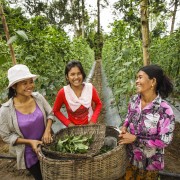
The U.S. Agency for International Development (USAID) is guaranteeing an $8 million Women’s Livelihood Bond that will provide access to credit, market linkages, and affordable goods and services for an estimated 385,000 Southeast Asian women.
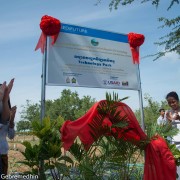
CE SAIN’s goal is to ‘transform agri-food systems through agricultural research, education and innovation.’ This transformation shifts food production from soil- and labor-intense methods that degrade the environment to those that actually enhance the environment. This is known as sustainable intensification. Sustainable intensification improves resource efficiency and productivity without harming our land or water. This goal and all of USAID’s agricultural activities align with and support the objectives laid out in the Agricultural Strategic Development Plan of the Ministry of Agriculture, Forest and Fisheries.
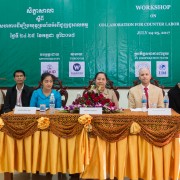
Human trafficking is a global human rights challenge. It preys upon the vulnerable, breaks down the rule of law, and corrupts global commerce. No challenge may be greater than the transnational crime of human trafficking that impacts millions of people worldwide each year - including people from Cambodia. The United States government cares deeply about countering trafficking in persons because it affects not just individuals and their families, but also communities and entire countries, regardless of where they are or what their level of economic development. Experience shows us that strong global coordination among government, civil society, and the private sector is critical to stop human trafficking. The Royal Government of Cambodia shares our concern and the National Committee for Counter Trafficking has provided the leadership and coordination needed to make real progress against human trafficking.
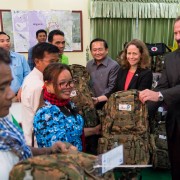
I have had the privilege of experiencing the awesome beauty of Prey Lang and meeting many of the people who have dedicated their lives to protecting that incredible landscape since I arrived last year. I was touched by their stories and humbled by the challenges they face everyday. This is one of the many reasons I am pleased to be here today as we recognize communities who live in and near forests as well as the rangers for the incredible responsibility they shoulder.
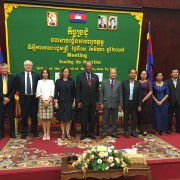
First, when we talk about nutrition, we usually highlight alarming numbers and note disturbing trends. One of the most powerful examples I use for Cambodia is that one out of every three children under five is stunted. Last night, I was reviewing some nutrition notes at home, and when I read this statistic, I thought of my three wonderful daughters, who were playing around me, and I reflected that one would likely have been stunted if circumstances were different and I was a mother in Cambodia.








Comment
Make a general inquiry or suggest an improvement.